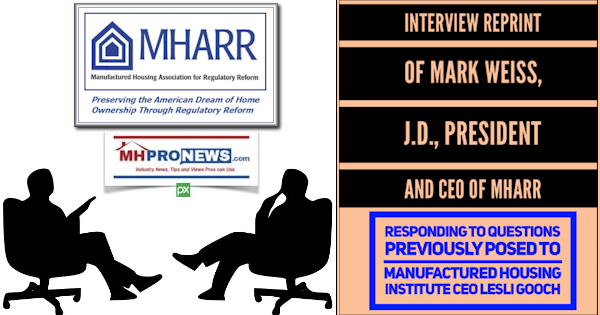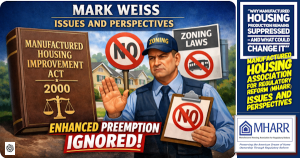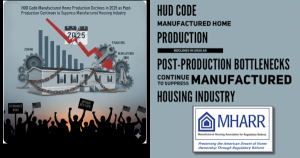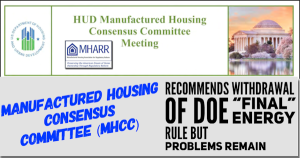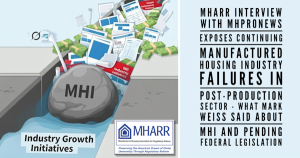NOVEMBER 5, 2024
TO: MHARR MANUFACTURERS
MHARR STATE AFFILIATES
MHARR TECHNICAL REVIEW GROUP (TRG)
FROM: MHARR
RE: REPRINT of MHProNews INTERVIEW
with MHARR PRESIDENT and CEO
Attached for your review and information is a self-explanatory reprint of an MHProNews interview with MHARR President and CEO, Mark Weiss.
Please contact MHARR if you have any questions regarding this interview, or would like any additional information concerning this document.
cc: Other Interested HUD Code Manufactured Housing Industry Members
Manufactured Housing Association for Regulatory Reform (MHARR)
1331 Pennsylvania Ave N.W., Suite 512
Washington D.C. 20004
Phone: 202/783-4087
Fax: 202/783-4075
Email: MHARRDG@AOL.COM
Website: www.manufacturedhousingassociation.org
Multi-Housing News (MHN) Interview Redux – Mark Weiss, J.D., MHARR President and CEO
Responds to Questions Previously Posed to Manufactured Housing Institute CEO Lesli Gooch
On September 11, 2024, a housing industry publication, Multi–Housing News (MHN), published an interview with Manufactured Housing Institute (MHI) CEO, Lesli Gooch, on “Barriers to New Supply” – factors suppressing the growth and expansion of the affordable manufactured housing industry.
To us at MHProNews, as the industry’s leading on-line manufactured home publisher, the answers provided to these questions by MHN seemed incomplete in some cases and misdirected in others. Also, we know, from years of covering the manufactured housing industry, that there are differing views within the industry on many of the issues presented and that there are two national trade associations representing industry members. As a result, we contacted MHN to encourage them to pose the same questions to MHARR and its President/CEO, Mark Weiss.
With no response to that inquiry forthcoming from MHN, MHProNews, to correct the record and prevent unnecessary confusion or misunderstanding among manufactured housing pros and others interested in more affordable manufactured housing, we posed the same (or substantively similar) questions to Mr. Weiss for responses from the perspective of MHARR.
Those questions and responses are below. [Original interview posts on MHProNews are linked here and here.]
MHProNews: What stands in the way of developing more manufactured housing communities (MHCs) around the United States?
MARK WEISS: As MHARR has already analyzed in detail – and published in a previous White Paper
– there are two principal bottlenecks that continue to restrict the evolution and growth of the HUD Code manufactured housing industry (into annual production levels in the hundreds-of-thousands of homes), both in terms of the development of new MHCs and the placement of individual manufactured homes. Those bottlenecks – both of which reside within the industry’s postproduction sector — are discriminatory/exclusionary zoning laws and constraints on the availability of market-competitive manufactured housing personal property (chattel) loans.
As far as solutions are concerned, Congress has provided the industry and its consumers with two outstanding laws – the Manufactured Housing Improvement Act of 2000 (2000 Reform Law) and the Duty to Serve (DTS) provision of the Housing and Economic Recovery Act of 2008 (HERA) – to address and resolve both such matters.
Regarding exclusionary zoning, the 2000 Reform Law specifically enhanced the federal preemption mandate enacted by Congress in the National Manufactured Housing Construction and Safety Standards Act of 1974 to “broadly and liberally” include all state or local “requirements” of any kind that impair the federal superintendence of the manufactured housing industry. And, lest there be any doubt about the meaning of this amendment, subsequent communications from the congressional sponsors of this legislation to HUD make it clear that this change was intended to include within the scope of federal preemption under the Act, zoning laws which exclude manufactured housing.
Similarly, the Duty to Serve mandate directs Fannie Mae and Freddie Mac to provide federal securitization and secondary market support for all types of manufactured home consumer loans, including the nearly 80% of the market represented by personal property loans. Significantly, there is an important interface and connection between the DTS mandate and the discriminatory zoning exclusion that the industry and its consumers face. Specifically, the full, robust and marketsignificant implementation of DTS would result in many more sales of new manufactured homes. Larger numbers of HUD Code homes entering the market, in turn, would create additional demand for new and expanded communities within which to place such homes. Consequently, as a simple matter of supply and demand, the full implementation of DTS would spur the growth of new, expanded and upgraded MHCs.
Neither of these beneficial laws, however, have been implemented by their relevant government agencies (i.e., HUD and the Federal Housing Finance Agency — FHFA) to benefit American consumers of affordable housing. Instead, in each case, for two decades (or more), these crucial statutory mandates have been ignored and subverted by HUD and FHFA, to the extreme detriment of American consumers of affordable housing, with little or no effective push-back from the industry’s post-production national representation. The industry’s post-production sector and its national representation, accordingly, have failed – and continue to fail – to aggressively pursue the full, robust and proper implementation of both of these crucial mandates.
Instead, that representation is constantly approaching Congress, seeking – unsuccessfully – new or modified laws that are not needed to resolve these issues and, in fact, are little more than windowdressing because, as noted above, these matters are already addressed by and in existing law. The roadblock facing the industry is not a lack of laws, but rather, a lack of implementation of those existing laws that will not be resolved by adding yet more laws that will similarly be ignored by relevant government agencies. What is needed, is concerted pressure on the agencies involved to fully implement the laws that exist, not more meaningless declarations.
That does not mean, however, that there is no role for Congress or no need to engage with
Congress. First, the industry must press for absolute parity for manufactured housing in any and all laws and programs that pertain to housing and consumer home financing. Second, the industry should be seeking hard-hitting and aggressive congressional oversight of HUD, FHFA, Fannie Mae and Freddie Mac for their continuing failure to fully and properly implement all aspects of the 2000 Reform Law and the DTS mandate.
Thus, rather than trying to reinvent the wheel by seeking new and additional laws, the industry should prioritize the full implementation and enforcement of the good laws that are already on the books.
MHProNews: Why is there such a slow pace in achieving zoning changes if affordable housing demand is so great?
WEISS: The slow pace of change is a function of two principal causes. First, zoning policy in any given community is driven by vested interests, not by those seeking access to that community via affordable housing. Multiple studies have shown that over time, zoning policy has been abused to function as a means of exclusion, rather than inclusion, by existing homeowners and related interests.
Second, and more significant in the specific case of comprehensively federally-regulated manufactured housing, is the failure of HUD to enforce the enhanced federal preemption of the 2000 Reform Law to prevent communities from excluding mainstream HUD Code homes, and the parallel failure of the industry’s national post-production representation to effectively demand the enforcement of that provision. Instead of joining with MHARR in demanding that HUD fully implement enhanced federal preemption to prevent the exclusion of mainstream manufactured homes that HUD itself comprehensively regulates, the industry’s post-production national representation seems to devote more of its time, effort and resources to developing and promoting more costly hybrid types of so-called “off-site-built” housing in an apparent effort to sidestep – rather than eliminate — exclusionary zoning targeting HUD Code homes.
While MHARR would rather “fight than switch,” in regard to such blatant and baseless discrimination, others appear all too willing to switch to higher-cost hybrid types of homes, rather than fight for the mainstream HUD Code industry and the consumers who rely upon mainstream, affordable manufactured homes.
MHProNews: Those who oppose having a manufactured home in their neighborhood often claim that having MHCs close-by will lower their property values. Is such a claim valid?
WEISS: Absolutely not.
Just as background, the industry has already dealt with and addressed most of the early reasons (e.g., aesthetics, appearance, quality, durability) cited for discriminatory attitudes and local zoning opposition to manufactured housing. Such early objections, based upon the perception of manufactured homes as “trailers,” were largely resolved as a result of – and in the wake of – the adoption of the original federal manufactured housing law in 1974. These improvements corresponded with sustained production levels of 100,000 homes per year – or more – through 2000. Then, the enactment of the 2000 Reform Law marked the completion of the crucial transition from the ”trailers” of the past to today’s modern, affordable, energy-efficient manufactured homes.
Yet, some negative perceptions persist, despite not only the improvements cited above, but also repeated studies by well-respected organizations, including the Urban Institute, which have concluded that mainstream manufactured homes, while maintaining their inherent, nonsubsidized affordability for Americans at every rung of the economic ladder, can and do appreciate over time.
In part, these continued negative perceptions have resulted from the small – and declining number – of communities with older pre-HUD Code models that have been allowed to deteriorate along with the properties themselves. As time progresses, more of today’s modern, attractive manufactured homes are being incorporated within MHCs by both individual homeowners and the MHCs themselves. At the same time, more modern management practices have resulted in more attractive, upgraded communities. This, combined with the amenities offered by today’s modern manufactured housing, have helped to overcome much of the outdated negative perception of MHCs, while offering moderate and lower-income families an attractive, cost-effective homeownership option.
The open and obvious improvements that have been made in the quality and aesthetics of today’s modern manufactured homes, however, are, in too many cases, irrelevant to local zoning officials, who simply do not want affordable manufactured homes and lower/moderate-income people in their communities. For many if not most of these officials, discrimination against manufactured homes and manufactured homeowners is, in reality, grounded in a discriminatory bias against the HUD Code (and homes built to the HUD Code) in relation to other building codes and the homes built to those codes (e.g., site-built homes, apartment buildings, other “factory-built” homes, etc.).
Such bias (disguised or otherwise) should not be occurring and should not be tolerated. Quite simply, the enhanced federal preemption of the 2000 Reform Law gives HUD all the power and authority that it needs to ensure that the manufactured homes it regulates are available to all Americans in all communities. The fact that HUD, for over 20 years, has refused to use this authority – in the face of an admitted affordable housing crisis – represents a crucial failure on its part and on the part of an industry national pos-production representation which has not forced the issue.
MHProNews: How do MHC residents perceive their homes?
WEISS: While subjective opinions are difficult to gauge and can vary, multiple studies have shown that manufactured homeowners, as a whole, view their homes positively and as an essential avenue to homeownership at an affordable price. This is consistent with studies, including a study by HUD itself, showing that mainstream HUD Code manufactured homes are more affordable not only than purchased site-built homes, but also the cost of renting other types of residences.
MHProNews: In June, HUD established a program to allow for the purchase, refinance, or renovation of manufactured housing under a loan program sponsored by the Federal Housing Administration (FHA). What is your take on the program and its potential impact on the manufactured housing sector?
WEISS: With the billions of tax dollars that HUD has shoveled out the door for so-called “housing” programs over the past few years, this is little more than a “throw-away” to mollify the industry and consumers. But it is little more than a token gesture when the industry and consumers need new and expanded communities, and the zoning and consumer financing needed to spur and maintain such growth.
As to individual homebuyers, MHARR took a leading role in encouraging FHA to modernize and upgrade its Title I manufactured housing loan program. That program, which had been a significant source of market-competitive consumer manufactured home lending in the past, had fallen to negligible levels of activity of the past decade, as the manufactured housing consumer lending market has simultaneously become unduly and unhealthfully concentrated in just a few hands, to the ultimate detriment of both the industry and consumers. MHARR, accordingly, pressed FHA to substantially revise and reform its “10-10” rule which, over that same period, had effectively excluded new and other lenders from the FHA Title I market. That pressure has now resulted in significant changes by FHA to relax the “10-10” rule and create the necessary conditions to attract new and additional lenders to the Title I program. If taken-up by industry lenders, the modernization and liberalization of the Title I program should increase the number of participating lenders and increase competition, ultimately benefitting manufactured homebuyers.
MHProNews: How difficult has it been for MHC developers and owners to obtain financial support for their projects in today’s economic environment?
WEISS: The question originally asked by MHN of MHI’s CEO Lesli Gooch, in and of itself, misses the point. The main driver underlying the slow or non-existent pace of development of new MHCs (and expansion of existing MHCs), has been – and continues to be – discriminatory zoning and land use opposition. While both Fannie Mae and Freddie Mac have helped to provide financing support for manufactured home communities as an aspect of DTS, the far more significant impediment to the development of new, expanded and upgraded MHCs, has been local opposition through zoning and placement restrictions. This only underscores the need for HUD to assert the enhanced federal preemption of the 2000 Reform Law to ensure that today’s modern and affordable HUD Code homes are not excluded from entire communities. While zoning “research” and databases are all well and good, local land use regulators must be told unequivocally that federal law supports the availability of affordable, mainstream manufactured housing for all Americans, and that land use prohibitions cannot be abused as a subterfuge for excluding affordable housing and homeownership.
MHProNews: Are there particular areas where the demand for affordable housing, particularly manufactured housing, is higher than in other parts of the U.S.?
WEISS: This question only serves to highlight a key aspect of the land use exclusions that the industry and its consumers face.
The short answer is “yes” – of course there are such areas. They are largely in inner cities and closein suburban areas, where the need for affordable housing is most acute and where, not coincidentally, affordable, mainstream manufactured homes are most often excluded by zoning and/or placement restrictions. The industry’s answer, in such cases, should not be to change the nature of the industry’s product and, thereby, render it less affordable (if not totally inaccessible) to lower and moderate-income homebuyers but, rather, aggressively press for changes to such zoning and placement exclusions. This would necessarily have to include, as explained earlier, demanding that HUD enforce enhanced federal preemption in order to invalidate such laws.
MHProNews: What actions have or should be taken to alter the perception of manufactured housing among the public and policymakers?
WEISS: Lingering negative perceptions of modern HUD Code manufactured homes are not a function of the quality or attractiveness of today’s HUD Code homes but, rather, are a relic of a now bygone era. As such, they are not based on or grounded in current day reality, but are a discriminatory manifestation of outdated and unsupported biases. Like other types of irrational bias and discrimination, they serve no positive purpose, inflict undue harm on those most in need of community support and understanding, and should have no place in America’s hometowns. HUD should be at the forefront of eradicating such discrimination through its broad federal preemption mandate. ##

